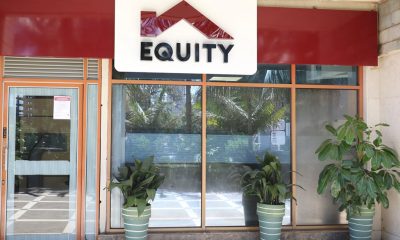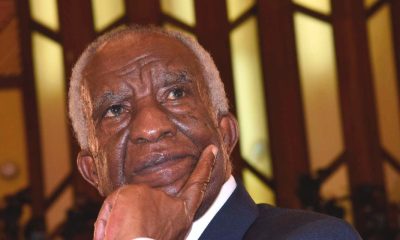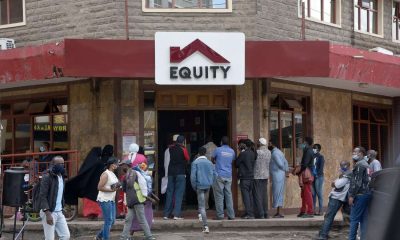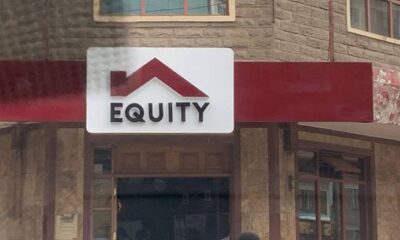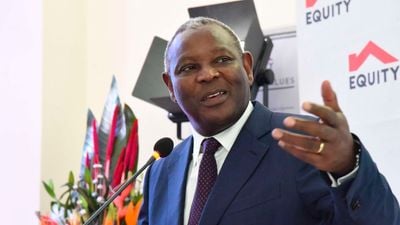Business
Troubled Equity Bank Fires Executives Amid Loan Fraud Scandal In Tanzania
The bank has come under harsh criticism from businessmen who’re now accusing the lender of violating their loan terms.
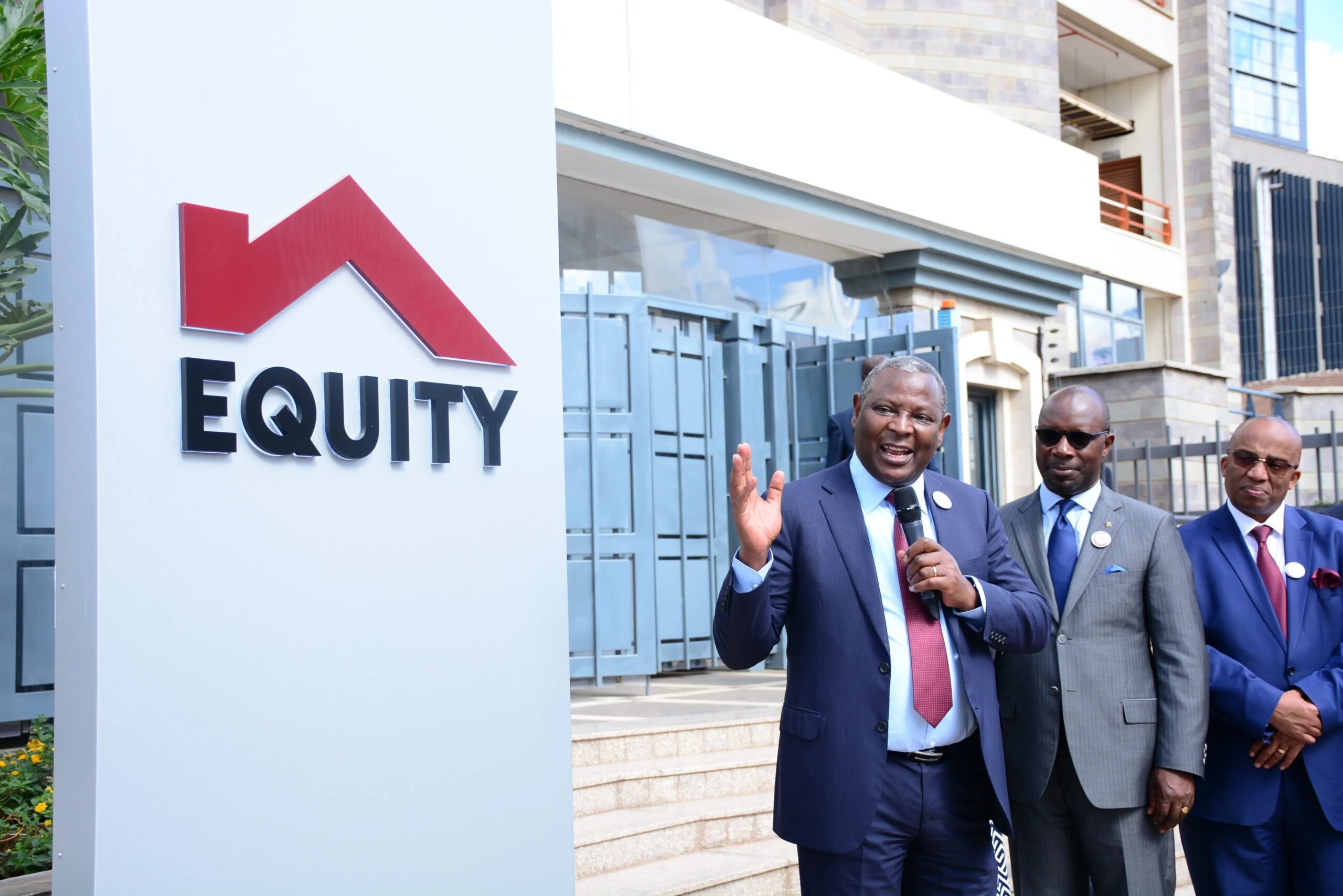
Equity Bank Group is going through a major crisis in the region. In Kenya, investigations are now reveling that the recent MasterCard fraud was an insider job. In Uganda, the bank is also in the middle of a $16 million insider loan scandal.
Equity Bank Tanzania the subsidiary of Equity Bank Kenya Limited is at the center of accusations of tampering with the growth of the country’s economy, a matter that is stemming from what they term as exploitative practices.
This points to a serious problem that debts the reputation of one of the biggest regional lenders.
The bank has come under harsh criticism from businessmen who’re now accusing the lender of violating their loan terms.
Equity Bank has recently lost multiple cases to Tanzanian firms in which about USD58million (Ksh7.8 billion) was lost in controversial loans that have been termed fraudulent.
The mega scandal has caused panic within the bank and seen a massive exodus and firing of executives from the lender according to sources speaking to Kenya Insights.
According to sources, among those dismissed unceremoniously include; The Director of Public Services, Director of Payments, Group Director of Finance, Group Director of Commercial, Director of Administration, Director of SME, Director of Credit, Managing Director, General Manager Administration and Executive Director.
Claims by the bank blaming the local businessmen for playing them dirty is being dismissed from many fronts, “the noise of Equity Bank being robbed is pure ignorance because these are the perpetrators and they are the ones responsible for causing their bank these problems!” Kigogo, a Tanzanian newspaper reported.
The current storm comes at a time when Equity Bank Tanzania Limited and Equity Bank Kenya Limited are challenging a High Court judgement made last year favoring State Oil Company.
Deceiving loans
In summary, Equity Bank lost a lot of money in Tanzania because they allegedly lied about financing a steel rods project. The bank was supposed to give money to Tanzanian firms, but instead another company gave them money. The court has ordered Equity Bank to pay damages to the firms they misled.
The original case was filed by State Oil against Equity Bank Tanzania following a dispute over the repayment of a $18.64 million loan owed by State Oil to Equity Bank Kenya, which was represented by Equity Bank Tanzania.
The company initiated the case after Equity Tanzania, which acted as the guarantor agent for Equity Bank Kenya in facilitating the loan, demanded repayment.
The case in question dates back to 2018, when State Oil took a $18.64 million loan from a foreign lender, Lamar Commodity Trading DMMC of Dubai, with Equity Bank Kenya’s guarantee.
To secure the loan, State Oil also pledged its assets to Equity Bank Kenya, under the supervision of Equity Tanzania.
However, State Oil either failed or neglected to repay the loan to Lamar, resulting in its guarantor, Equity Bank Kenya, having to settle it, thus becoming the creditor.
After the deadline for repaying the loan passed without payment, Equity Bank Tanzania demanded repayment from State Oil on behalf of Equity Bank Kenya as its agent entrusted with the guarantee. State Oil then sought refuge in the courts. In the case, the company requested the court order Equity Bank Tanzania to return the assets it had pledged as collateral for the guarantee from Equity Bank Kenya, arguing that it was not indebted to the banks.
During the trial, among the witnesses were representatives of Lamar, the lender, who testified that State Oil had failed to repay its loan and instead its guarantor, Equity Bank Kenya, had paid.
However, in its judgement issued by Justice Stephen Magoiga on October 1, 2021, the court agreed with State Oil’s claims that it had already repaid its debt in full, and thus the banks had no claims against it.
The judge ordered all assets pledged by State Oil to be returned to the company.
Finer details
The High Court in Dar es Salam accused Equity of deceiving regulators that it issued letters of credit to four Tanzania firms for receiving steel roads from Dubai’s Lamar Trading DMCC and edible and crude oil from Singapore’s Numora Trading PTE.
The Judge reckoned that Equity never issued letters of credit—a guarantee from a bank to settle defaulted suppliers’ dues—and instead acted as an agent in a deal that saw Numora and Lamar offer $35.16 million (Sh5.3 billion) in cash to Tanzanian firms despite not being recognised as financiers.
The court also declared the deal null and void in a decision that has seen the Kenyan lender lose its claim of Sh5.3 billion.
It ordered Equity Bank to pay Sh60.9 million in damages to the four firms, State Oil Tanzania, Nas Hauliers, Everest Freight and Tanga Petroleum for pursuit of the irregular loan.
In 2017, Equity Bank Kenya acted as a guarantor for State Oil Tanzania, which borrowed $18.64 million (Sh2.8 billion) from Dubai’s Lamar Trading DMCC.
In the paperwork, Equity Bank falsely stated that State Oil was purchasing steel rods worth Sh2.8 billion from Lamar, court papers show.
Equity Bank massaged the paperwork to avoid scrutiny from regulators, who would have flagged the deal because Lamar is registered as a trader, not a lender.
The bank emerged from the deal as one issuing letters of credit for the transaction where State Oil was purchasing steel rods worth $18.64 million (Sh2.8 billion) from Lamar on credit.
In reality, the Equity Bank was cited as an agent by the judge, who declared that the letters of credit were non-existent.
Everest Freight
The same script followed the Nas Hauliers, Everest Freight and Tanga Petroleum deal.
Equity Bank stated its role as issuance of letters of credit guaranteeing a $16.275 million (Sh2.4 billion) loan from Singapore’s Numora Trading PTE in 2019.
Just like Lamar, Numora is registered as a commodity dealer in food, edible and crude oil.
“Since the monies were not deposited in Tanzania by the lender, the regulator cannot allow repayment without first being brought to light about the underlying contract upon which the standby letter of credit (SLBC)/letter of credit (LC) is based as well as proof of fulfilment of the SBLC/LC of prior agreements,” Dar-es-Salaam Judge John Nangela ruled in an April judgement recently made public.
“All such concerns negatively impact on the defendants (Equity Bank Tanzania and Equity Bank Kenya), leave alone the fact that the respective SBLC/LC was not, as stated earlier, issued by Equity Bank Kenya,” the judge added.
The borrowers were all Equity Bank Tanzania clients. They had sought to borrow and offset other burdening loans.
But Tanzanian laws bar such huge amounts being lent to a single borrower, capping the lending to between 25 percent and five percent of core capital. In December, the Tanzanian subsidiary could lend a maximum of Sh1.12 billion to a single customer.
Equity Bank Tanzania referred the firms to its parent in Kenya counting on its outsized balance sheet.
Equity Bank Kenya channelled the firms to Nisk Capital, an East Africa focused investment bank and financial advisory firm Nairobi-based, which in turn led the companies to Lamar and Numora.
The side deal bound Equity to pay Lamar and Numora in the event the Tanzanian firms defaulted.
The loan was not listed with the Bank of Tanzania. Lamar and Numora wired funds to Equity Bank Kenya, which opened escrow accounts in Nairobi.
The Tanzanian firms defaulted, forcing Equity to pay Lamar and Numora in the hope of recovering the funds through auctioning security provided for the issuance of the letters of credit.
But in two judgments, Tanzania’s courts dashed Equity Bank’s hopes by ruling in favour of the borrowers, who separately sued the lender to stop the auction of their assets.
In both cases, the judges ruled that Equity Bank was just an agent, and had no right to demand loan repayment.
The judges argued that Lamar Commodity Trading DMCC and Numora Trading PTE should demand Sh5.3 billion as the lenders.
In April, Judge Nangela ordered Equity Bank to pay $300,000 (Sh45.7 million) to three firms – Nas Hauliers, Everest Freight and Tanga Petroleum – in damages for the pursuit of the debt.
Judge Stephen Magoiga had in October 2021 ordered that the lender pay State Oil Tanzania damages of $100,000 (Sh15.2 million) in 2021.
Judge Nangela in April said Equity risked landing in trouble if it submitted doctored documents to the Bank of Tanzania in pursuit of recovering funds lost in the loan deal Numora had with Nas Hauliers, Everest Freight and Tanga Petroleum.
Tanzanian firms
The court judgments may have sealed Equity Bank’s fate as the lender has been blocked from pursuing the Tanzanian firms and ordered to release cars and land it targeted for auction to recover Sh5.3 billion.
Stuck with the bills, Equity Bank Kenya paid $18.64 million (Sh2.8 billion) to Lamar on January 28, 2020, in line with the standby letter of credit.
For the Nas Hauliers transaction, Equity Bank Kenya released $16,275,000 (Sh2.48 billion) to Numora credit after the default.
The court papers do not specify when the amount was paid but show that payment was made to Numora’s account at Standard Chartered Bank Malaysia by Equity Bank through Citi Bank New York.
Lamar is one of the companies that bagged controversial multi-billion-shilling deals to supply the Kenya National Trading Corporation (KNTC) with farm inputs under President William Ruto’s subsidised fertiliser programme, which is aimed at lowering food production costs.
The firm has a Sh2.7 billion deal to supply the KNTC with 30,000 tonnes of NPK fertiliser.
State Oil Tanzania surrendered six title deeds for land in Dar-es-Salaam, Dodoma, Mwanza and Ruvuma. The firm also surrendered ownership documents for 30 Volvo trucks and 30 fuel tankers.
Nas Hauliers, Everest Freight and Tanga Petroleum have similar shareholding and directorship. They provided six title deeds for land in Shinyanga and Dar-es-Salaam as security. Both loans were to be offset within five years.
Interest on the loans was to be paid in advance, with the Tanzanian firms offsetting the principal in five equal instalments each year.
In State Oil Tanzania’s loan, the standby letters of credit issued indicated that the firm was purchasing 23,300 tonnes of hot steel in coils and cold rolled steel plates.
On December 10, 2018, Lamar disbursed $17.44 million (Sh2.65 billion) to Equity Bank Kenya to cater for State Oil Tanzania’s loan. Lamar had deducted $1.2 million (Sh1.8 billion) to cater for interest for the first year.
Equity Bank then opened an escrow account in Nairobi, with the lender and State Oil Tanzania as the joint owners.
State Oil Tanzania
In court, however, State Oil Tanzania claimed that Equity Bank Kenya was in full control of the escrow account. Equity Bank Kenya then paid off State Oil Tanzania’s loans.
State Oil Tanzania at the time owed Equity Bank Tanzania $10.183 million (Sh1.5 billion), ABC Bank $4.253 (Sh647 million), FNB $567,688 (Sh86.3 million) and TIB 332,769 (Sh50.6 million).
In the State Oil Tanzania deal, Equity Bank Kenya received $372,800 (Sh56.7 million) in commission. Nisk Capital received $750,000 (Sh114.1 million) in commission.
The $736,899 (Sh112.3 million) balance was paid into State Oil Tanzania’s account with Equity Bank Tanzania.
For Nas Hauliers and its sister firms, Lamar claimed to have surrendered all its rights under the deal to another company, Singapore-registered Numora Trading PTE.
On June 4, 2019, Numora Trading PTE disbursed $14,123,527 (Sh2.15 billion) to Equity Bank. The Singaporean firm had deducted $2.151 million (Sh327.9 million) to cater for interest for the first year.
Equity Bank Kenya opened an escrow account in Nairobi, with it and Nas Hauliers listed as the joint owners.
Nas Hauliers owed $8.87 million (Sh1.35 billion) to Equity Bank Tanzania, $1.49 million (Sh227 million) to Amana Bank and $450,000 (Sh68.4 million) to UBL Bank.
In this deal, Equity Bank Kenya enjoyed a commission of $390,600 (Sh59.5 million). Equity Bank Tanzania received $2 million (Sh304 million) for operational costs.
The $978,586 (Sh149.1 million) balance was paid into Nas Hauliers’ account with Equity Bank Tanzania.
After one year, the firms were set to start offsetting the principal amount. This meant that State Oil Tanzania should have paid $3.728 million (Sh568.2 million) in December 2019.
Nas Hauliers was due for a $3.255 million (Sh496.1 million) payment in June 2020.
Because the loans could not be registered with the Bank of Tanzania, there was no credit reference bureau in Tanzania indicating that the four firms had defaulted on any borrowings.
In court, State Oil Tanzania argued that Lamar breached the contract by sending money to Equity Bank Kenya.
Director Nilesh Suchak also argued that Equity Bank Kenya’s actions amounted to operating illegally in Tanzania and veiling the transaction by using Equity Bank Tanzania’s name and face.
In court, Equity Bank maintained that it issued letters of credit to help the Tanzanian firms secure the loans.
The letters of credit, the bank argued, were issued after the Tanzanian companies surrendered various assets as security.
Foul play
Businessmen in Tanzania are now blaming foreign banks such as Equity Group for frustrating economical growth in the country.
“The other day I read about the statistics of the number of billionaires in East African countries and I saw that Kenya is leading. I wondered why Tanzania does not make billionaires? Why is our economy not growing? I have come to discover that there is Economic Intelligence going on through these foreign banks against our businessmen in order to weaken them and bring them into bankruptcy.” A Tanzanian analyst who sought anonymity said.
He goes ahead to loud the Tanzanian judicial system in saving the investors from the rabbit hole they had been put.
“These businessmen have been able to get out of that trap only because they decided to stand in the primary case and used a lawyer who is honest and who cannot be manipulated, that is why they have won the case otherwise this Bank would have bankrupted them because that is their main goal. But also in the investigation conducted by the Central Bank in the flow of these cases, they have found out that there are many loans given by this bank without following the financial procedure, so they were acting against the financial law of the country.” He added.
He notes a consistency that he alleges is a mega scheme to derail the growth of Tanzanians, “This shows that there is a dirty game going on in these Banks to affect the economy of our Nation and this Game involves some of our fellow Tanzanians who are not patriotic in undermining the economy of Businessmen and the Nation in General.” He said linking the recent Ugandan $16million load fraud that we highlighted in a previous article.
In the case, some Equity Bank Uganda Ltd employees are under investigation for alleged fraud involving stock loan and agent float financing.
Kenya Insights allows guest blogging, if you want to be published on Kenya’s most authoritative and accurate blog, have an expose, news TIPS, story angles, human interest stories, drop us an email on [email protected] or via Telegram
-

 Business4 days ago
Business4 days agoCooking Fuel Firm Koko Collapses After Govt Blocks Sh23bn Carbon Deal
-

 Business3 days ago
Business3 days agoABSA BANK IN CRISIS: How Internal Rot and Client Betrayals Have Exposed Kenya’s Banking Giant
-

 Politics2 weeks ago
Politics2 weeks agoYour Excellency! How Ida’s New Job Title From Ruto’s Envoy Job Is Likely to Impact Luo Politics Post Raila
-

 Business2 weeks ago
Business2 weeks agoMinnesota Fraud, Rice Saga, Medical Equipment Deal: Why BBS Mall Owner Abdiweli Hassan is Becoming The Face of Controversial Somali Businessman in Nairobi
-

 Americas3 days ago
Americas3 days agoEpstein Files: Bill Clinton and George Bush Accused Of Raping A Boy In A Yacht Of ‘Ritualistic Sacrifice’
-

 News2 weeks ago
News2 weeks agoKenya Stares At Health Catastrophe As US Abandons WHO, Threatens Billions In Disease Fighting Programmes
-

 News2 weeks ago
News2 weeks agoDCI Probes Meridian Equator Hospital After Botched Procedure That Killed a Lawyer
-

 Investigations1 week ago
Investigations1 week agoPaul Ndung’u Sues SportPesa for Sh348 Million in UK Court, Accuses Safaricom Boss of Sh2.3 Billion Conspiracy

